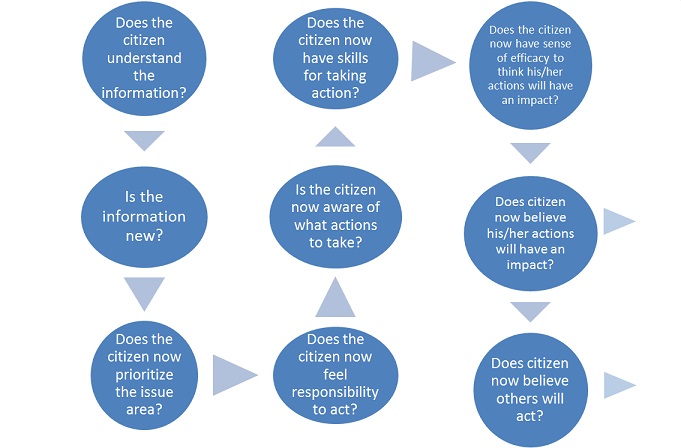Brief 19: Generating Citizen Activism
EGAP Researcher: Daniel Posner, Evan Lieberman, Lily Tsai
Partners: Twaweza
Geographical Region: Africa
Preparer: Abby Long
Background:
Development organizations around the world rely on the assumption that when people get more information on the quality of public services they are receiving, this will lead to them to pressure their government to improve those services. There is not, however, evidence that this assumption always holds. To test this belief, the authors of this study take advantage of a program in Kenya called the Uwezo Initiative, in order to identify the factors that lead to citizen activism.
The Uwezo Initiative’s goal is to provide education information to parents to inspire them to try to improve their child’s reading and writing at home and to take action in the community to better the education system. Uwezo does this by conducting tests for children in selected households in literacy, numeracy, and reading comprehension and presenting the results to the parents. After the testing, an Uwezo volunteer provides materials to parents that can “improve their child’s learning” and that encourages theparents to become more involved in bettering the education system. Uwezo is implemented in Uganda and Tanzania as well, but the authors focus on Kenya for this study. Kenya has an active civil society and history of its citizens mobilizing around social issues, so it is a particularly auspicious environment for the Uwezo Initiative to work.
Research Design:
Uwezo’s annual assessment and outreach is already randomly implemented among Kenyan villages and households. The authors identify a set of villages that were not chosen to participate in Uwezo to compare to those that were. These (control) villages are selected to be as close as possible to the Uwezo villages across a range of characteristics that might be related to citizen action. The authors then administer a survey to both groups and compare the results.
Findings:
In contrast to the assumption that more information makes citizens more likely to increase their involvement in their child’s education and the community, the authors find no evidence that parents who participate in Uwezo are more likely to take action either publicly or privately. The authors’ survey also tests to see if Uwezo inspires action on any other form of public service delivery besides education and they still find no evidence that Uwezo has any significant effect.
Why wasn’t there an effect?
In this case, the authors speculate that much of the information provided by Uwezo isn’t new. According to the survey, Uwezo told most of the parents information they were already expecting, so it’s unlikely that this information would change the parent’s behavior. And since citizens are (plausibly) more likely to take action over bad news, the fact that Uwezo presented many of them with evidence that their children were actually learning at an above average level, no reason appears for them to mobilize. In addition, the survey finds that more than 85% of the parents in the comparison and treated group were “somewhat satisfied” with the quality of English teaching at their child’s school- showing little reason for these parents to improve upon what already satisfies them. Even among families where parents were likely to have received bad news, the study did not find these parents more likely to take action in the home or in the community. The survey also uncovers that, for Kenyans, education is not a priority over other public services. Kenyan parents surveyed also felt as though it isn’t their responsibility to make sure teachers came to school and taught. Most also do not know what to do to improve education privately or publicly and whether or not these measures will have an impact. In sum, all of these factors meant that this aspect of the Uwezo Initiative could not succeed in generating activism around education as it had originally intended. (The authors note that Uwezo has undertaken other activities as part of its mission which were not included in this evaluation study.)
Policy Implications:
In explaining the lack of impact in the study, the authors created a framework (Figure 1) that can be used to determine if the conditions are right for an informational intervention to generate citizen activism. If any of the questions below can be answered with a no, the chance of an informational intervention generating any activism decreases.

Countless development programs in many parts of the world are information-based interventions like Uwezo. These programs can be designed with this framework in mind in order to maximize the program’s potential. Development organizations can also use this framework to revisit failures of other informational intervention programs and determine what might have gone wrong or how their program can be improved.